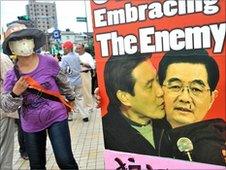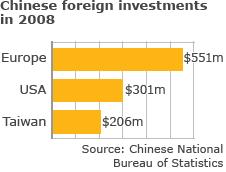Taiwan weighs up historic China trade deal
- Published

There is concern in Taiwan over the influx of cheaper Chinese goods
Standing in a plaza with thousands of other protesters, 50-year-old Chang Fu-meng couldn't think of anything more important to do on a Saturday.
The fisherman from Kaohsiung county, in southern Taiwan, had travelled by bus for hours with his wife to protest against an historic free trade agreement (FTA) Taiwan is scheduled to sign with China.
"I'm most worried about mainland [China's] products coming here. Taiwan's small and medium-sized enterprises won't be able to survive and workers won't be able to find work," said Mr Chang, about the expected influx of cheaper Chinese goods once tariffs are cut.
But, economics aside, Mr Chang and others fear even more that the agreement would harm the sovereignty of the island.
Taiwan cherishes its democracy and self-rule, but is still considered by China as a province to be reunified, despite being ruled separately since the end of a civil war in 1949.
"Taiwan will never be able to become a country after this deal is signed," said Mr Chang.
Mutual benefits
The agreement comes at a time of dramatically improved relations between the two former rivals.
It is a culmination of the past two years of efforts by Taiwan's President Ma Ying-jeou to reduce tensions and strengthen economic ties with China, its politically and economically powerful neighbour.
But many people here are ambivalent about whether the deal will be good or bad for Taiwan in the long run.
What is for certain is that it will give each side's exports and investments greater access to the other's market, making the Chinese and Taiwanese economies more integrated than ever.
The short-term consequences for Taiwan are easier to foresee - initially about 250 types of Chinese product will be able to enter the island with reduced and eventually no tariffs.
Twice as many Taiwanese products will get similar treatment in China.
But that is just the beginning.
The trade deal not only paves the way for more products to be traded tariff-free between the two sides, but would also allow investments by both in the other's market in unprecedented ways.
China could soon invest in Taiwan's financial, service, property and industrial sectors. Other than farm products and Chinese labour, everything else is up for negotiation for entry to Taiwan after the deal is signed, government officials have told the BBC.
The long-term impact is harder to gauge.
The government in Taipei says the deal is expected to boost Taiwan's economic growth by as much as 1.7%, to increase trade with its biggest partner and to enable Taiwan to sign free trade agreements with other countries to avoid economic isolation.
But critics say the agreement will make the island too economically dependent on China.
Despite previous decades of tension and Taiwanese government restrictions on the amount of money its companies can invest in China, the mainland has long been the obvious top choice for Taiwanese business people, thanks to the proximity between the two sides, similar language and culture and China's cheap labour and vast market.
As it stands, 40% of Taiwan's exports and the biggest chunk of its overseas investments already go to China.

After the agreement is signed, money will no longer go just one way: Chinese money will come here.
That, critics and others say, could give Beijing a way to control Taiwan's politics, society and sovereignty.
"In the years to come after the FTA is signed, it may be very difficult to separate Taiwan from China," said Sung Kuo-chen, a research fellow specialising in Taiwan-China relations at the National Chengchi University in Taipei.
"For example, the fruits you buy may be Chinese, many people around you may be Chinese compatriots. Eventually, you might be able to take Taiwanese currency and use it in China. In that sense, what is separate about China and Taiwan?"
Perhaps 50 years from now, Taiwan may be like a province of China in all but name, some analysts say.
Taiwan may very well be able to keep its current democratic system and self-rule, and China's leaders may even eventually accept the concept of Taiwan having a president, analysts say.
While this peaceful annexation of Taiwan by China may not happen right away - or at all - there are fears that with so much money tied to China, big business interests and Beijing's influence could chip away at Taiwan's democratic way of life and pressurise the central and local governments to bow to Beijing on various issues.
Critics point to former British colony Hong Kong, which returned to Chinese rule in 1997.
There, criticisms of Beijing by the media or even academics are subdued for fear of hurting business interests.
Already in Taiwan last year, hotel and tourism industry officials in its traditionally pro-independence city of Kaohsiung urged its mayor not to show a film China objected to, for fear of losing Chinese tourists.
New opportunities
Less than two years after Taiwan opened its doors to Chinese tourists, they have become the biggest group of overseas visitors to the island - totalling about one million and contributing $1bn to Taiwan's economy in just the first 18 months.
"In the long term, (how Taiwan and mainland China's relationship will turn out) will depend on whether China will be sensible enough to be friendly toward Taiwan," said Joseph Cheng, a political science professor at City University in Hong Kong.
"This is the approach Beijing is more likely to adopt. Instead of asserting pressure, Beijing wants to charm Taiwan. Beijing recognises it has to rely less on military, more on charm offensive."
President Ma has insisted the agreement is economic, not political, and has vowed not to discuss unification with China during his term in office.
He has expressed optimism that Taiwan can deal with pressure from Beijing.
"Never underestimate Taiwan's democracy and press freedom," President Ma said.
Despite the protests, surveys have shown about 40% of Taiwanese favour the deal, while the others are evenly split between opposing it and being undecided.
"I support this deal," said Ewing Lin, an aircraft engineer. He will soon be able to work in China because the trade deal allows Taiwanese companies to invest in aircraft maintenance there.
He also expressed the hope of many that closer ties could reduce the chances of military conflict between the two sides and pave the way for long-term peace.
"This deal will raise the economy of Taiwan and bring relations between Taiwan and China closer," Mr Lin said.
"We don't want war in the Taiwan Strait!"
- Published26 June 2010
- Published24 June 2010
- Published21 May 2010